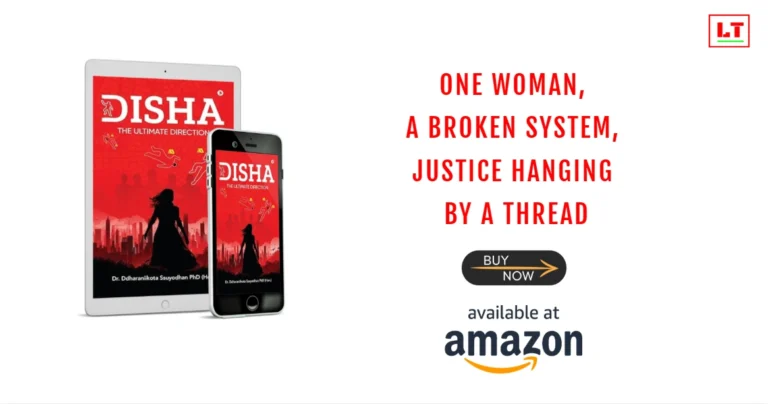In a literary landscape dominated by entertainment, Disha: The Ultimate Direction stands apart as a crime thriller with a conscience. Blending suspense with a call for justice, this debut novel by Dr. Ddharaniikota Ssuyodhan sheds light on gender violence, systemic failures, and the courage to confront uncomfortable truths.
We sat down with Dr. Ssuyodhan — a lawyer, social reformer, and now author — to discuss his inspiration, creative process, and message behind this powerful work.
Question 1: Dr. Ssuyodhan, what inspired you to write Disha: The Ultimate Direction?
Answer by Dr. Ddharaniikota Ssuyodhan:
The book was born from real pain and outrage. The brutal Disha case shook our collective conscience, and I wanted to channel that grief into something constructive — a story that raises awareness and urges change. My legal background helped me explore justice from both emotional and systemic perspectives.
Question 2: The title itself — The Ultimate Direction — feels symbolic. What does it signify?
Answer by Dr. Ddharaniikota Ssuyodhan:
It reflects the journey toward truth and justice, both individually and as a society. “Disha” means “direction,” and I wanted readers to feel that pursuit — the idea that justice is not a destination, but a direction we must keep moving toward.
Question 3: How much of your experience as a lawyer influenced the plot and characters?
Answer by Dr. Ddharaniikota Ssuyodhan:
Quite significantly. I’ve seen firsthand how justice can be delayed or denied, not because of lack of law but lack of empathy and will. Those experiences helped me shape authentic characters — from police officers to victims’ families — and depict the emotional weight behind every legal battle.
Question 4: Many readers have praised how the book balances suspense and social message. Was that intentional?
Answer by Dr. Ddharaniikota Ssuyodhan:
Yes, absolutely. I didn’t want the novel to be just another thriller. The suspense keeps readers turning pages, but the message makes them pause and think. Each twist is designed to reveal not only who did it, but also why society lets such things happen.
Question 5: The female lead in Disha is portrayed as strong yet deeply humane. What inspired her character?
Answer by Dr. Ddharaniikota Ssuyodhan:
She represents every woman who refuses to be silenced. I wanted her to embody courage that is quiet yet powerful — the kind that exists in real women who stand up for justice every day, whether in courtrooms or homes.
Question 6: What was the most challenging part of writing this book?
Answer by Dr. Ddharaniikota Ssuyodhan:
Balancing emotion with objectivity. Writing about violence, injustice, and trauma is emotionally exhausting. I had to revisit disturbing realities, but at the same time, I wanted to offer hope — to show that courage and reform are still possible.
Question 7: How do you see literature contributing to social change?
Answer by Dr. Ddharaniikota Ssuyodhan:
Stories can do what statistics cannot — they make people feel. When readers emotionally connect to a story, it stays with them. Literature has the power to shift perspectives, spark dialogue, and make justice a personal responsibility, not just a legal one.
Question 8: What kind of research went into Disha?
Answer by Dr. Ddharaniikota Ssuyodhan:
Extensive legal and psychological research. I studied case files, crime reports, and rehabilitation frameworks to ensure accuracy. I also interacted with police personnel, lawyers, and NGOs working on gender-based violence to bring authenticity to the narrative.
Question 9: What message do you hope readers take away from Disha: The Ultimate Direction?
Answer by Dr. Ddharaniikota Ssuyodhan:
That justice begins with awareness — and courage. Change doesn’t always start in courtrooms; it starts in conversations, in choices, in empathy. If the book makes even one reader reflect or act, it has achieved its purpose.
Question 10: Finally, what’s next for you as an author?
Answer by Dr. Ddharaniikota Ssuyodhan:
I plan to continue writing stories that challenge and inspire. Disha is just the beginning — I’m working on my next novel, which will explore moral accountability in a different social context, again blending realism with suspense.


